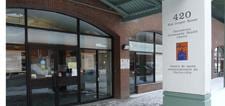A half dozen gay men fill out forms in the waiting room of the Centretown Community Health Centre. It’s Thursday evening, when the community health centre converts into a no-hassle clinic for gay men who want to get sexual health information and tests.
At the far end, two AIDS Committee of Ottawa volunteers assemble packages of lube, condoms and sexual health information.
Chatelaine magazine has been replaced with copies of OUT and The Advocate, but visitors don’t have much time to linger over them. That’s because clients are being called rapidly into the maze of exam rooms for instant and anonymous HIV testing and STI checks.
It’s a far cry from the three-hour waits at the Clarence St Sexual Health Clinic. But while GayZone is just finding its legs, the bus strike may be keeping gay men away from the walk-in clinic.
Staff there can’t say for sure, because the clinic’s only been open since September. But anecdotally, there’s cause for concern, says Cathy Collett, who runs the Centretown Community Health Centre.
“The combination of the bus strike and the cold is probably a factor,” she says.
Accessibility, parking and traffic have all been affected by the strike, she adds.
Half a block away, the number of visitors to Pink Triangle Services has shrunk by as much at two thirds. At Pink Triangle Youth’s Wednesday night meeting, the usually boisterous crowd of about 30 has shrunk to just seven, says Ken Mews, PTS’s executive director.
“That’s significant,” says Mews, even considering that January is the end-of-term for the city’s high school students.
As of press time, the City of Ottawa and the Amalgamated Transit Union appear to be at an impasse — setting the scene for an extended strike.
Meanwhile, the city is offering taxi chits to social services that need help connecting clients to their services. It’s something Mews says he’s “looking into” for clients at PTS.
At the AIDS Committee of Ottawa, some days traffic is down 50 percent, says Mark Lucas, who looks after gay men’s health projects there.
“That’s the food bank, the drop in, and people accessing other social services,” says Lucas.


 Why you can trust Xtra
Why you can trust Xtra


